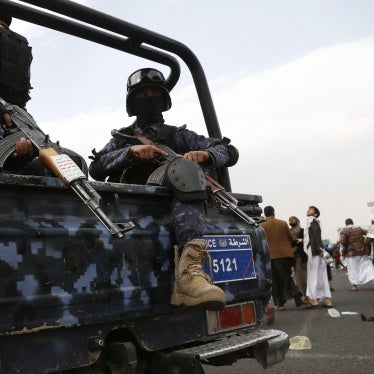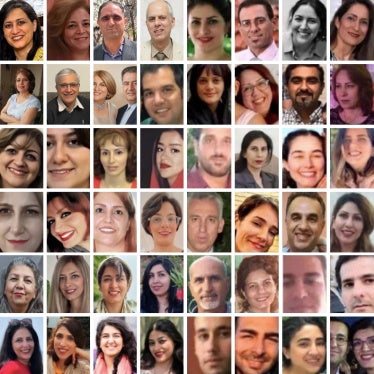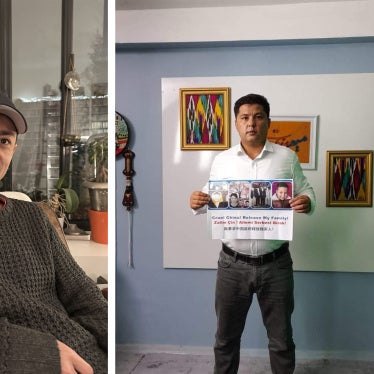Tunisia has been credited with having the most effective democratic transition in the region. This now risks being derailed by the reintroduction of repressive laws.
(Tunis) - Recent violence in Tunisia set off by religious radicals’ reaction to an art exhibition that they deemed offensive to Islam has revived a discussion here about defamation of religion and freedom of expression. Ennahdha, the Islamist party that is the largest political group in the National Constituent Assembly (NCA), has responded by declaring that it will introduce a law to criminalize offenses against the sanctity of Islam. Such laws could quickly create a new form of censorship under the mantle of the protection of religion.
Tunisia has been credited with not only initiating the Arab spring but also with having the most effective democratic transition in the region. This now risks being derailed by the reintroduction of repressive laws.
It all started on June 10, when dozens of people protested against four artworks at Printemps des Arts, a fair organized in a state-owned palace in the northern suburbs of Tunis. One had the words “Sobhane Allah” (Praise belongs to Allah) painted with ants. Another represented the stoning of three women and two others had caricatures of Salafists - the hardline Islamic believers.
The protesters broke into the palace late at night and vandalized some of the artworks before the police succeeded in dispersing them. The situation quickly snowballed. Riots erupted on June 11 in several locations across the country, with protesters - consisting of ultra-conservative religious groups as well as criminal gangs - setting fire to courts, police stations and other institutions, an Interior Ministry spokesman said. One person died in the violence and dozens were wounded.
The protests reached a climax when several preachers in mosques across the country condemned the art fair, some openly calling their followers to apply the ‘hadd’, the Islamic death sentence, against the artists for being apostates.
The violence subsided after the interior minister imposed a curfew and a ban on demonstrations planned by several Salafist groups and Ennahdha on June 15. In all, about 160 protesters were arrested.
While condemning the attacks, the government and the parties in the governing coalition have said that the origin of the crisis was, as the spokesperson for the government put it, the “unbridled freedom of expression” that was used by the artists to attack the “sanctity of Islam.”
Then the National Assembly’s Ennahdha group said that it would propose criminalizing offenses against the sanctity of Islam in the future constitution. “Freedom of expression and the freedom of artistic creativity, even if they are among the freedoms of which we approve, should not be absolute with no controls,” Sahbi Aatig, head of the Ennahdha group, said in a communiqué↑ ↑ on June 12.
In a news conference the same day, the culture minister announced that he will lodge a criminal complaint against the organizers of the exhibition for showing art that is offensive to Islam. He didn’t say what law he plans to use to lodge this complaint, given that the Tunisian penal code does not contain such an offense.
On June 13, the president, the head of government and the president of the National Constituent Assembly issued a joint communiqué condemning any attack against the sanctity of Islam and saying freedom of expression and opinion doesn’t cover such offenses as their objective is provocation and sedition.
These reactions are based on the assumption that freedom of expression should be limited when it comes to opinions related to religion. This position had been promoted by the Organization of the Islamic Conference, which introduced a resolution on defamation of religion in 1999 at the UN Commission on Human Rights. However, after a decade-long struggle at the UN, this approach has been facing growing opposition and was later put aside at the UN by the OIC, on the basis of an agreement that universal human rights standards protect individuals rather than abstract ideas or religions. The UN Human Rights Council’s resolution 16/18 of March 2011, agreed by consensus, dropped any notion of defamation of religion as a permissible limitation to free expression.
In international law, the UN Human Rights Committee, the body of experts that definitively interprets the International Covenant on Civil and Political Rights, stated in its detailed interpretation of freedom of expression that “prohibitions of displays of lack of respect for a religion or other belief system, including blasphemy laws, are incompatible with the covenant” except in the very limited circumstances set out in the covenant - such as advocacy of religious hatred that constitutes incitement to discrimination, hostility or violence.
There were good reasons why this happened. The notion of “sanctity of religion” is prone to sweeping interpretations. The lack of definition of what exactly this expression means inevitably leads to granting arbitrary discretion to interpreters, be it authorities, prosecutors or judges. In addition, it offers hardliners among the religious authorities wide opportunity to cast anathema on any work or expression that they deem contrary to orthodox interpretations.
Examples of how this notion was used to quash criticisms of religious doctrines are rife in the contemporary history of the Muslim world. In Egypt, the Court of Cassation found in 1995 the Egyptian thinker Nasr Hamed Abou Zaid, who wrote several books contesting the orthodox interpretations of sharia law, guilty of blasphemy, and ruled that he was an apostate. He had to flee to the Netherlands to avoid being divorced from his wife as the court could rule that a Muslim woman cannot be married to a non-Muslim man.
Similarly, the Pakistan Penal Code makes it an offense to outrage the religious feelings of any class of the citizens of Pakistan, by words, either spoken or written, or by visible representations that insult the religion or the religious beliefs of that class. Likewise, insulting the prophet Muhammad or any of his wives, or companions or the Caliphs is prohibited. Punishments range from fines to life imprisonment - even the death penalty. These provisions were used to sentence the writer, Younus Shaikh, to life imprisonment for publishing the book, The Satanic Cleric in 2001, in which he argued that stoning to death (Rajam) as punishment for adultery was not mentioned in the Quran.
Some western countries also have blasphemy laws. Article 196 of Poland’s Penal Code criminalizes offending religious feelings through public calumny of an object or place of worship. This provision was used in 2012 to fine Dorota Rabczewska, a Polish pop star, for offending “religious feelings” after she declared in an interview that she doesn’t believe in the Bible because it was written by “people who drank too much and smoked herbal cigarettes.”
In Tunisia, the proposal for blasphemy laws risks becoming a Trojan horse that will reintroduce censorship in a still fragile transition to democracy. Such laws could subvert freedom of expression and clamp down on opponents under the veil of respect for religion. They should be rejected.
Amna Guellali is a Middle East and North Africa researcher at Human Rights Watch, based in Tunis.








